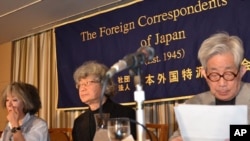A citizen's group in Japan says it has collected five million signatures - halfway to its goal - on a petition calling on the government to permanently shut down all nuclear power plants in the country. But amid traditional apathy among Japanese toward political movements and longstanding strong ties between power companies and lawmakers in a resource-poor country, anti-nuclear campaigners are acknowledging an uphill struggle.
The meltdowns of three reactors at a Japanese nuclear power plant 10 months ago have helped energize millions of people here to sign a petition calling for an end to reliance on atomic energy in the country.
Petitioners in Tokyo and Osaka separately say they have collected enough signatures for referenda in Japan's two largest cities. But it is unclear if those campaigns will clear all the legal hurdles to get on the ballot.
The Fukushima disaster also gave rise to some of Japan's largest public protests in decades, which have been peaceful. But one of the most prominent domestic anti-nuclear figures in the country, Nobel laureate for literature Kenzaburo Oe, says citizens' initiatives have not gone far enough.
Speaking to reporters Wednesday, Oe called for a national referendum on nuclear power. He contends Japanese seismologists have understated the risk of earthquakes at reactor locations and that some nuclear industry scientists in the country have reversed opinion and now express doubts about the safety of Japan's aging reactors.
The Fukushima-1 nuclear power plant suffered a catastrophic failure on March 11, following a magnitude 9.0 earthquake that generated a killer tsunami.
Oe also called for children in Fukushima to undergo detailed screening for internal radiation exposure, comparing their plight to the victims of the atomic bombs dropped on Hiroshima and Nagasaki at the end of World War Two.
Sitting alongside Oe, another prominent author, Keiko Ochiai, says she is not terribly optimistic that the majority of her fellow citizens will see things their way.
The author says she feels the crest of the wave of the anti-nuclear sentiment after last year's disaster has already passed.
Proponents of nuclear power say the economic benefits outweigh the relatively small environmental and health risks, noting that - aside from nuclear - Japan is almost entirely dependent on imported fossil fuels for its economy. They contend alternative forms of energy are not yet efficient nor affordable for Japan.
All but three of Japan's 54 nuclear reactors are offline, mainly because of safety inspections or routine maintenance. Media reports say the government hopes to bring two of them back into operation as soon as April, amid concerns a prolonged hiatus could lead to blackouts and factory shutdowns.
Anti-Nuclear Campaign in Japan Moves Forward, Acknowledges Struggles
